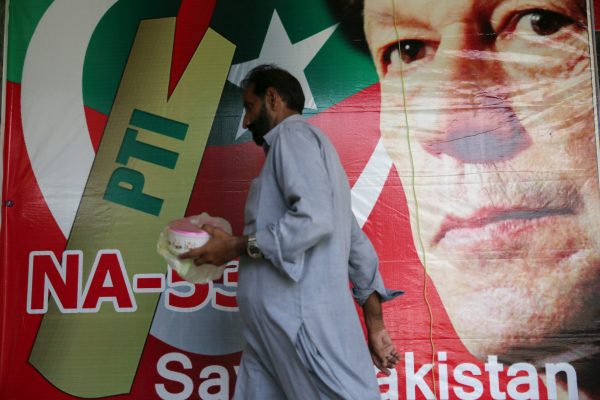Khan is a confident and determined leader, and he likely has big expectations about what his soon-to-be-formed government can do. His confidence will be further buoyed by the fact that his governing coalition should be quite robust. Many observers expected the PTI to fall far short of an absolute majority, necessitating a long and difficult search to find partners — some of them unfriendly — to fill out a coalition.
But the party gained more seats than many analysts expected. It should easily be able to fill the gap in seats by turning to a few willing independents and smaller parties. Instead of a weak and fractious power-sharing arrangement, the PTI will preside over a relatively strong coalition.
But if Khan and the PTI think they’ll have it easy, they are dead wrong. Pakistan’s next government will face several pressing challenges that will require immediate attention. The far-reaching policy objectives that Khan laid out in his 26 July speech will need to be set aside, at least initially.
First, Khan will confront an angry opposition. The Pakistan Muslim League-Nawaz (PML-N) party, which led the previous government, alleged for months prior to the election that the PTI was receiving support from Pakistan’s powerful army. It also claimed that the armed forces were engineering efforts behind the scenes to undercut the PML-N’s electoral prospects. The PTI’s surprisingly wide margin of victory will only intensify the PML-N’s suspicions.
The PML-N and many other parties also allege that the election day was marred by massive fraud. The PML-N prime minister candidate, Shehbaz Sharif, denounced the poll as the dirtiest in Pakistan’s history. While some of these grievances will eventually subside and melt away, the possibility of mass protests by the aggrieved parties can’t be ruled out.
Despite having a strong coalition, the PTI may struggle to advance its legislative agenda in the face of an obstructionist opposition. Even before the election, Pakistan’s political environment was dangerously polarised. It will be even more so now.
Second, Khan will need to make major decisions about the economy. The country faces a looming crisis amid rapidly plunging reserves and balance of payments problems — driven in great part by the massive loans pouring into Pakistan from China for the China–Pakistan Economic Corridor (CPEC). The PTI will need to decide whether to request a bailout from Beijing, which may be refused, or ask for a loan from the IMF. Going to the IMF is never a popular political move in Pakistan, and it’s been five years since Islamabad last did so.
Beyond the domestic political risk, Islamabad could also anger its critical Chinese ally by going to the IMF. An IMF loan would require Pakistan to be more transparent about its finances, meaning that the notoriously opaque deals associated with CPEC would be subject to scrutiny. Perhaps Khan would be comfortable with this: he has said previously he favours bringing more transparency to CPEC contracts. Either way, the PTI will need to move quickly on the economic front.
Third, Khan will need to act on the issue of extremism. Thanks to a robust counterterrorism offensive launched in 2014, rates of terrorist violence are down significantly in Pakistan. But it is still a major issue for the nation. Alarmingly, Pakistan was convulsed by a series of mass casualty assaults in the days prior to the election, including one that killed about 140 people — the deadliest single incident since 2014.
While Pakistan may have eliminated many terrorists, the hateful ideologies that drive and nurture militancy remain deeply entrenched and are propagated by a range of influential information sources (from clerics and television news anchors to public school textbooks). A plan by the previous government to target hate speech and other extremist ideas, implemented after a Taliban attack on a school killed about 150 children in 2014, has lapsed.
Complicating the issue for Khan is that he and his party have been accused of exacerbating Pakistan’s entrenched environment for extremism. These accusations stem from Khan’s perceived soft spot for militancy (he opposed Pakistan’s efforts to kill terrorists in the past, instead advocating for negotiations) and the party’s embrace of the country’s blasphemy laws, which are exploited by hardliners to accuse religious minorities of offending Islam.
The PTI’s honeymoon will be brief, and it will quickly be put to the test. How it handles these early challenges could go a long way toward determining the trajectory, and the success, of Pakistan’s next government.
Michael Kugelman is the Asia Program Deputy Director and Senior Associate for South Asia at the Wilson Center. He can be found on Twitter @michaelkugelman.

